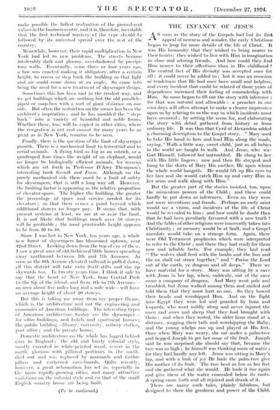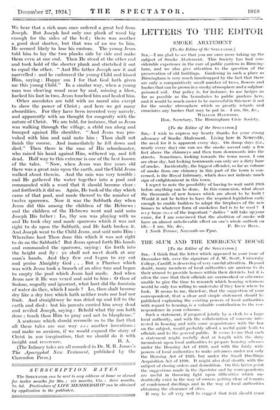THE INFANCY OF JESUS
AS soon as the story of the Gospels had lost its first appeal of newness and wonder, the early Christians began to long for more details of the life of Christ. It was His lminanity that they wished to bring nearer to their hearts; they wished to live with Him in imagination as close and adoring friends. And how could they find Him nearer to their affections than in His childhood ? The central fact of His divinity was accepted once for all ; it could never be added to ; but it was an occasion of tenderness that He had once been small and helpless, and every incident that could be related of those years of dependence increased their feeling of comradeship with Him. So some began to fill out the story with inference ; for that was natural and allowable : a preacher in our own days will often attempt to make a clearer impression upon us by relating to us the way in which incidents must have occurred ; by setting the scene for, and elaborating the story with detail gathered from history or from ordinary life. It was thus that Cyril of Alexandria added a charming description to the Gospel story. " Mary used to take His hand in hers and lead Him along the roads, saying, ' Walk a little way, sweet child,' just as all babies in the world are taught to walk. And .Jesus, who wa; God Himself, followed her untroubled. He clung to her with His little fingers ; now and then He stopped and hung to the skirts of Mary His mother, He upon whom the whole world hangeth. He _would lift up His eyes to her face and she would catch Him up and carry Him in her arms and walk along with Him."
But the greater part of the stories insisted, too, upon the miraculous powers of the Child ; and these could hardly be put down as inferences. Even so, they were not mere inventions and frauds. Perhaps an early saint would see a vision, and incidents of the life of Christ would be revealed to him ; and how could he doubt then that he had been peculiarly favoured with a new truth ? And the fables of other religions were innocently taken into Christianity ; or memory would be at fault, and a Gospel anecdote would take on a strange form. Again, there were Old Testanient prophecies which were interpreted to refer to the Christ ; and there they had ready for them new and reliable facts. For example, they had read " The wolves shall feed with the lambs and the lion and the ox shall eat straw together," and " PraiSe the Lord out of the earth, ye dragons and all deeps." There we have material for a story. Mary was sitting by a cave with Jesus in her lap, when, suddenly, out of the cave came a company of dragons. And Mary went pale and trembled, but Jesus walked among them and smiled and told them that they must hurt no one: So they bowed their heads and worshipped Him. And on the flight into Egypt they were led and guarded by lions and leopards, who went mildly along and never injured the oxen and asses and sheep that they had brought with them ; and when they rested, the older lions stood at a distance, wagging their tails and worshipping the Baby, and the young whelps ran up and played at His feet. Once when Mary was weary, she sat under a palm-tree and begged Joseph to get her some of the fruit. Joseph said he was surprised she should say that, because the tree was so high ; he hiniself was thinking more of water ; for they had hardly any left. Jesus was sitting in Mary's lap, and with a look of joy He -bade the palm-tree give His mother of its fruit. The tree bent as low as her feet and she gathered what she would. He bade it rise again and give them of the water concealed below its roots. A spring came forth and all rejoiced and drank of it.
There are many such tales, plainly fabulous, but designed to show the goodness and power of the Child. We hear that a rich man once ordered a great bed from Joseph. But Joseph had only one plank of wood big enough for the sides of the bed ; there was another a., good deal shorter, but that was of no use to him. He seemed likely to lose his custom. The young Jesus told him to lay the two planks side by side and make them even at one end. Then He stood at the other end and took hold of the shorter plank and stretched it out to equal the other. " And His father Joseph saw it and marvelled : and he embraced the young Child and kissed Him, saying : Happy am I for that God hath given me this young Child." In a similar way, when a young man was cleaving wood near by and, missing a blow, hacked his foot in two, Jesus touched him and healed him.
. Other anecdotes are told with no moral aim except to show the power of Christ ; and here we get many absurdities. For they have been invented very naively, and apparently with no thought for congruity with the nature of Christ. We are told, for instance, that as Jesus was walking through the village, a child ran along and bumped against His shoulder. " And Jesus was pro- voked with him and said unto him : Thou shalt not finish thy course. And immediately he fell down and died." Then there is the case of His schoolmaster, who raised his hand against Him, withered up, and fell dead. Half way to this extreme is one of the best known of the tales. " Now, when Jesus was five years old there was a great rain upon the earth, and the Child Jesus walked about therein. And the rain was very terrible : and He gathered the water together into a pool and commanded with a word that it should become clear : and forthwith it did so. Again, He took of the clay which came of that pool, and made thereof to the number of twelve sparrows. Now it was the Sabbath day when Jesus did this among the children of the Hebrews : and the children of the Hebrews went and said unto Joseph His father : Lo, thy son was playing with us and He took clay and made sparrows which it was not right to do upon the Sabbath, and He hath broken it. And Joseph went to the Child Jesus, and said unto Him : Wherefore hast Thou done this which it was not right to do on the Sabbath? But Jesus spread forth His hands and commanded the sparrows, saying : Co forth into the height and fly : ye shall not meet death at any man's hands. And they flew and began to cry out and praise Almighty God . . . But a Pharisee which was with Jesus took a branch of an olive tree and began to empty the pool which Jesus had made. And when Jesus saw it He was vexed and said to him : 0 thou of Sodom, ungodly and ignorant, what hurt did the fountain of water do thee, which I made ? Lo, thou shalt become dry like a dry tree which hath neither roots nor leaf nor fruit. And straightway he was dried up and fell to the earth and died : but his parents carried him away dead and reviled Joseph, saying : Behold what thy son hath done : teach thou Him to pray and not to blaspheme."
A sentence which should reconcile us to the fact that all these tales are one way as A another inventions ; and make us anxious, if we-would expand the story of Christ in our imagination, that . we should do it with . (The Infancy tales are all recorded in Dr. M. R. James's The Apocryphal New Testament, published by the Clarendon Press.)



























 Previous page
Previous page